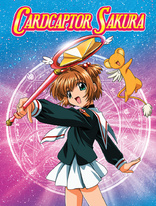Cardcaptor Sakura: Complete Series Blu-ray Movie
HomeCardcaptor Sakura: Complete Series Blu-ray Movie 
Premium EditionNIS America | 1998-2000 | 3 Seasons | 1750 min | Rated 13+ | Aug 05, 2014
Movie rating
7.9 | / 10 |
Blu-ray rating
| Users | 4.7 | |
| Reviewer | 3.5 | |
| Overall | 3.6 |
Overview
Cardcaptor Sakura: Complete Series (1998-2000)
Ten-year-old Sakura lives a pretty normal life with her older brother, Toya, and widowed father, Fujitaka. At least she did, until the day she returned home from school to discover a glowing book in her father’s study. After opening the book and releasing the cards within, Sakura is tasked with collecting each of these magical cards, while trying to live the life of a normal fourth grader. In the monumental task of collecting all the cards, Sakura must rely on her friends and family, and decide what she finds most important in life.
Starring: Sakura Tange, Aya Hisakawa, Masaya Onosaka, Junko Iwao, Motoko KumaiDirector: Morio Asaka
| Anime | Uncertain |
| Foreign | Uncertain |
| Fantasy | Uncertain |
| Comedy | Uncertain |
| Romance | Uncertain |
| Comic book | Uncertain |
| Teen | Uncertain |
| Adventure | Uncertain |
| Action | Uncertain |
| Mystery | Uncertain |
Specifications
Video
Video codec: MPEG-4 AVC
Video resolution: 1080p
Aspect ratio: 1.33:1
Original aspect ratio: 1.33:1
Audio
Japanese: LPCM 2.0 (48kHz, 16-bit)
English: LPCM 2.0 Mono (48kHz, 16-bit)
Subtitles
English
Discs
50GB Blu-ray Disc
Nine-disc set (9 BDs)
Playback
Region A (locked)
Review
Rating summary
| Movie | 4.0 | |
| Video | 3.5 | |
| Audio | 4.0 | |
| Extras | 3.0 | |
| Overall | 3.5 |
Cardcaptor Sakura: Complete Series Blu-ray Movie Review
Gotta catch 'em all!
Reviewed by Jeffrey Kauffman August 13, 2014My sons, one of whom is about to head off to college and the other who is (more or less) happily ensconced in high school, were at just the right age to catch the Yu-Gi-Oh! wave back in the late 1990s and early 2000s. As any parent with kids (especially boys) of these ages will most likely concur, it wasn’t enough to merely watch the show on television. Oh, no—rampant consumerism was drummed into these tots’ heads in every episode, and we dutiful parents had to go out and get the playing cards that were part of the ever expanding Yu-Gi-Oh! franchise. Around the time that I was shelling out a handy three figure sum for the “complete” set of Exodia cards (also known as The Forbidden One), I somewhat sheepishly confided to my wife that Japan finally was wreaking its revenge for the devastation foisted upon it at the end of World War II. Product tie-ins are certainly nothing new in the entertainment business, but the Japanese seem to have refined this idea to something approaching an art form, albeit an art form heavily interlaced with Art’s (capital A) traditional nemesis, Commerce. Perhaps surprisingly, an earlier Japanese franchise which exploited a plot device involving cards never spawned an actual playing (and/or trading) card game, at least that I’ve been able to discern in an admittedly cursory online research effort. Cardcaptor Sakura aired at around the same time as the first Yu-Gi-Oh! series, and it might be seen as a sort of not so distant distaff cousin of the franchise that focused on the boy named Yugi Mutou. Cardcaptor Sakura is a so-called “magical girl” entry, one which centers on a sweet if somewhat naive young girl named Sakura Kinomoto. Sakura introduces herself in the first episode of the anime, letting the viewer in on her likes and dislikes at school. One day at her house she wanders into a basement library where she sees a book glowing mysteriously on the shelf. Obviously drawn to such a puzzling event, she pulls the tome out and is surprised to find it full of cards, including one named Windy. That appellation turns out to be all too descriptive, and when a huge gust sweeps through the library, Sakura is dismayed to see the cards dispersed right out of her grasp. She’s then confronted by the rather odd appearance of a winged teddy bear like creature who identifies himself as Cerberus, evidently not the many headed dog of Hades who has been the nemesis of characters as disparate as Dante to Harry Potter. Cerberus appoints Sakura with the title of Cardcaptor and tasks her with reclaiming the cards which are now scattered far and wide. What Sakura doesn’t initially realize is that each of the cards comes with requisite magical abilities and that she will in fact need to duel to restrain them and return them to their pack.
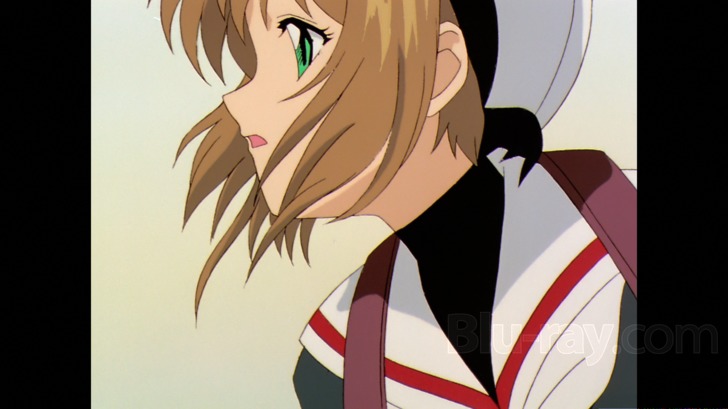
Magical girl entries like Puella Magi Madoka Magica reveal a darker subtext once the general outlines of the story have been introduced. Cardcaptor Sakura really has no such ambitions, and plays it much more straightforwardly, though this is not to say the series doesn’t have its own kind of depth. Though there are both traditional magical girl and (especially) shōnen elements in abundance throughout Cardcaptor Sakura, there’s also actual character development, with some nicely done evolution of various relationships. This is evident right off the bat with regard to both Sakura's best friend Tomoyo (a girl who frequently has a video camera seemingly physically attached to her head) and little Cerebrus, who almost immediately gets branded with the nickname Kero-chan.
As with many shōnen entries, the interplay between students and school life in general plays an important part in Cardcaptor Sakura, and in fact some viewers may feel the series tends to spend too much time on these elements, so much so that any given episode may only include relatively brief snippets of card capture and quasi-battle interplay. What’s interesting here, though, is how the series repeatedly tends to not boil things down to a “battle of the week” story approach. In fact many story arcs tend to spill over at least into a subsequent episode, at least insofar as tracking down and “sealing” an individual card goes.
Some elements may seem trite at first glance, but ultimately open up in some surprising ways. Sakura, who lives with her older brother Toya and their widowed father, has a rather pressing crush on Toya’s best friend Yukito (the first time she sees him in the series her eyes turn into huge beating hearts). Yukito is obviously quite a bit older than Sakura, and actually seems to be very fond of the girl, but he’s also not about to become romantically involved with a child. Meanwhile, a kid named Syaoran Li shows up and reveals he’s a distant descendant of the cards’ creator Clow Reed. He thinks capturing the cards should be his task, and he begins infiltrating Sakura’s attempts to get the pack back. Slowly, Syaoran begins to develop feelings for Sakura, but the show does not do the expected with this quasi-love triangle, and in fact there’s a rather surprising denouement with regard to one of these characters that comes relatively late in the game, and which casts a whole new light on what has gone before.
While some feel that 70 episodes reveals a certain tendency toward padding on the part of the show, it’s probably useful to remember how many episodes the original version of Dragon Ball Z trundled through before it got to its finale. The fact is, while there is a certain amount of tangential shōnen shenanigans here, especially in the early going, Cardcaptor Sakura actually ultimately reveals a rather well thought out architecture where little seeds that are planted early on reap rather large dividends, especially in the series’ final couple of handfuls of episodes. While there’s an undeniably “familiar” aspect to much of what goes on in Cardcaptor Sakura, there’s an equally undeniable sweetness to this offering that actually becomes more acute as the story progresses. The story here may not rise to the iconic levels of a Joseph Campbell hero’s (or heroine’s) quest, but it offers some nice character beats and a sense of things actually moving toward a satisfying, well crafted resolution that offset any hackneyed aspects.
Cardcaptor Sakura: Complete Series Blu-ray Movie, Video Quality 
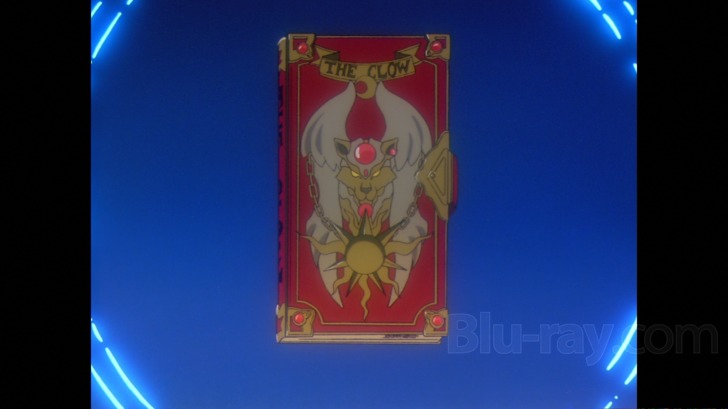
Cardcaptor Sakura is presented on Blu-ray courtesy of NIS America with an AVC encoded 1080p transfer in 1.33:1. Depending on your tolerance for what appears to be fairly aggressive denoising, Cardcaptor Sakura looks surprisingly spry for its age. Colors are bright, bold and vividly saturated, with elements like Sakura's gorgeous green eyes popping quite nicely throughout the many episodes. This is not the most complex animation anime fans will have ever seen, and in fact many midrange shots fill in few if any details (see screenshot 16 for an example), something that may have helped to preserve an overall level of detail. One way or the other, line detail remains generally strong. Character designs for the humans aren't especially innovative, but some of the card creatures are quite fanciful and look great. The biggest issue here for "original format" purists will be the almost absolute lack of grain. Yes, Cardcaptor Sakura looks enticingly clean and blemish free, but even freeze framing offers very little in the way of a natural organic presentation. There are smatterings of grain that are evident, especially in some sequences with lush blue backgrounds, but they're mere smatterings. Some with a higher tolerance for denoising will therefore feel this video score is too paltry, while those with a sensitivity toward this issue will think I've been far too generous. There are also some odd issues with image instability during the interstitials (like when episode titles are announced) on the magical circles that provide the backgrounds. Watch closely and you'll be able to see brief but evident shimmer in some of the lines as the circle rotates.
Cardcaptor Sakura: Complete Series Blu-ray Movie, Audio Quality 
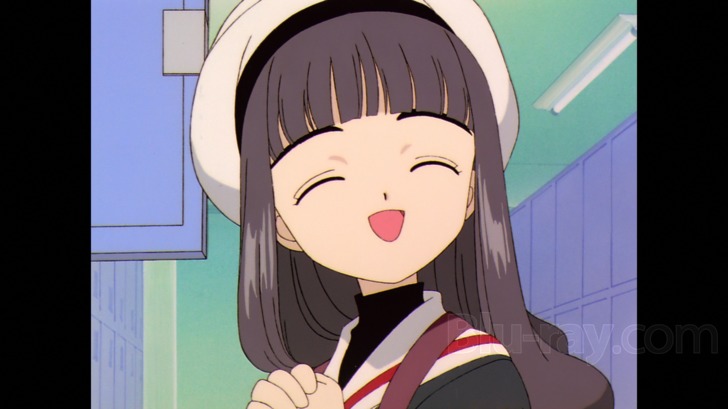
This new Blu-ray release of Cardcaptor Sakura created quite a bit of fan buzz when NIS America revealed it would include an English
dub. As fans of the series are only too aware, there was an English dub years ago, the so-called Nelvana dub, which attended the
heavily redacted version of the series which aired in the United States. There was then a second redaction which was much more aggressive
than, say, Dragon Ball Z Kai, completely reorganizing the
series and to some fans making its gynocentric elements less important (supposedly in hopes of attracting a younger male demographic).
There was another supposedly unedited dub known as the Animax dub done some time later, and it's that English language version which is
presented here in LPCM 2.0 mono. Even this dub is not complete, i.e., not all episodes contain complete English translations and there
are therefore moments with only subtitles. This was probably the best solution for NIS America, which is most likely not large and flush
enough to front bucks for an entirely new dub. All of this said, I really can't imagine many people will want to opt for the English track, which is
notably duller and flatter than the also included Japanese language track, presented in LPCM 2.0 (stereo). The Japanese track is much
more present sounding, fuller bodied and clearer, and there's excellent stereo separation that's evident from the first moments of the opening
theme. Voice work is excellent and clearly delivered on this track as well.
For the record, the Setup Menu offers these four choices:
- Japanese with English Subtitles
- English with Partial Subtitles
- English with Full Subtitles
- English with No Subtitles
Cardcaptor Sakura: Complete Series Blu-ray Movie, Special Features and Extras 
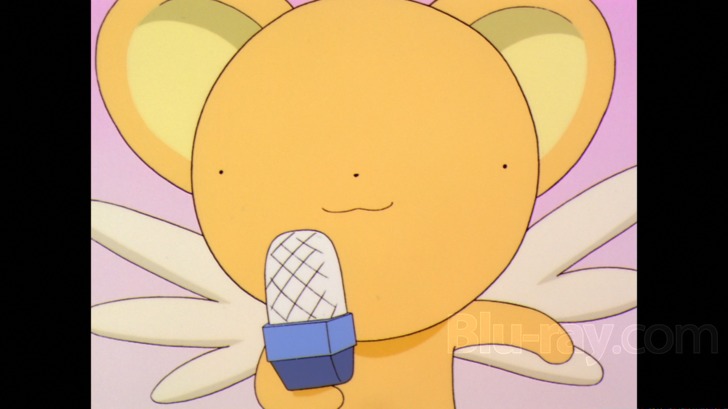
It seems clear now that NIS America has rethought the packaging strategy for their Premium Editions. As I mentioned in the Toradora!: Complete Series Blu-ray review ,
things are at least relatively more compact now, with a slipcase that approaches a standard DVD height. NIS America's older Premium Editions
were housed in a very handsome but admittedly oddly shaped format that made shelving them difficult (at least with the bulk of a standard
sized
Blu-ray collection). This set is slightly larger than Toradora simply by dint of the fact that it contains 9 discs. Once again a nicely
illustrated hardback book is included along with the Blu-rays. The supplements score above is for the entire set, including the book. The on
disc supplements are as follows (if a disc number is not listed, it means
there are no supplements on that particular disc):
- Clean Opening 1 (1080p; 1:20)
- Clean Opening 1 Version 2 (1080p; 1:20)
- Clean Ending 1 (1080p; 1:11)
- Trailers for other NIS America releases
- Clean Opening 2 (1080p; 1:20)
- Clean Ending 2 (1080p; 1:11)
- Clean Ending for Episode 46 (1080p; 2:34)
- Clean Opening 3 (1080p; 1:20)
- Clean Ending 3 (1080p; 1:11)
- Clean Ending for Episode 70 (1080p; 1:45)
- Trailers for other NIS America releases
Cardcaptor Sakura: Complete Series Blu-ray Movie, Overall Score and Recommendation 
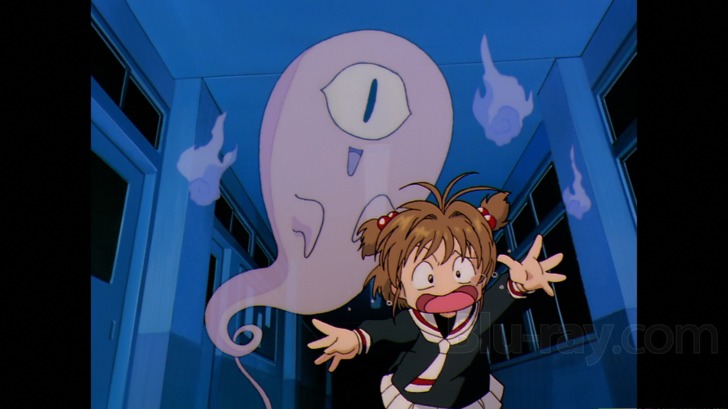
Those of us who were already well into our adult years by the time the 1990s rolled around may shudder to think of fans considering Cardcaptor Sakura a "nostalgia" item, but there's a definitely innocent feeling running through a lot of the episodes of this series that ends up being very appealing. Sakura is a wonderful character, beset with problems any young kid faces while also battling forces that are of course much more ominous and unique. While there are moments here and there that feel lethargic, by the time the series gets to its final 15 or so episodes, things really gel and fascinating pieces fall into place that may well catch even inveterate "twist guessers" by surprise. It will be interesting to see if there's the kind of backlash that the recent denoised Dragon Ball Z releases have engendered, though of course in those instances the original aspect ratio was also tampered with. The results here are not horrible by any stretch of the imagination, but there will no doubt be some fans who will find them less than optimal. The audio options are excellent for the most part, and the packaging is once again quite sumptuous and impressive. With caveats noted, Cardcaptor Sakura comes Recommended.
Similar titles
Similar titles you might also like

Cardcaptor Sakura: The Movie
Gekijôban Kâdokaputâ Sakura
1999

Cardcaptor Sakura Movie 2: The Sealed Card
2000

Sailor Moon: Complete First Season
1992-1993

Magic Knight Rayearth: Memorial Collection
1994-1995

Sailor Moon S: The Movie
Sailor Moon S: The Movie - Hearts in Ice
1994

InuYasha: Set 2
犬夜叉
2001

Sailor Moon R: The Movie
1993

Cardcaptor Sakura: Clear Card - Part 2
2018

Sailor Moon Super S: The Movie
1995

Ranma ˝: Set 1
1989

InuYasha The Final Act: The Complete Series
InuYasha: Kanketsu-hen
2009-2010

The Vision of Escaflowne: The Complete Series
Classics
1996

Kill la Kill Complete Box Set
キルラキル
2013-2014

Negima!: Complete Collection
2005

Fairy Tail: Collection 1
2009-2010

Spice & Wolf: Complete Series
2008-2009

Sailor Moon Crystal: Set 1
Limited Edition | Dark Kingdom Arc
2014

Fullmetal Alchemist: The Complete Series
2003-2004

One Piece: Collection 38
Episodes 917-940
2020

Howl's Moving Castle
ハウルの動く城 / Hauru no Ugoku Shiro
2004
